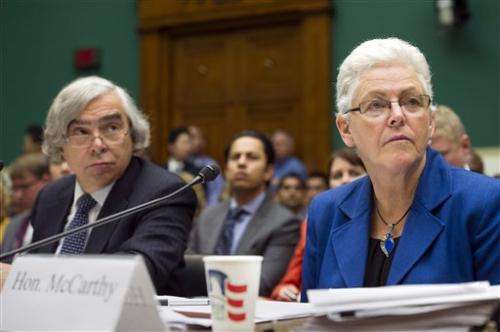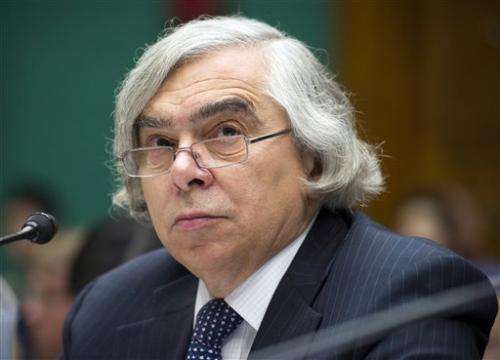Obama officials: Rule won't kill coal-fired power

President Barack Obama's top energy and environmental officials said Wednesday there is a future for coal, despite a pending regulation aimed at limiting global warming pollution from new power plants that Republicans and the coal industry say will doom the fuel source.
Energy Secretary Ernest Moniz and Environmental Protection Agency Administrator Gina McCarthy, questioned at a House hearing, both said coal-fired power would continue. Coal makes up about 40 percent of U.S. electricity.
"The rule will provide certainty for the future of new coal moving forward, and in terms of existing facilities, coal will continue to represent a significant source of energy for decades to come," said McCarthy, who did not disclose specifics.
The EPA is under a Friday deadline to release an updated proposal that would set the first-ever limits on carbon dioxide, the chief greenhouse gas, from new power plants.
The rule, which will ultimately force the EPA to tackle emissions from existing power plants as well, is a key component of Obama's strategy to tackle climate change. It is also one of the most controversial, since it addresses one of the largest uncontrolled sources of carbon pollution and will have ramifications for the power sector and everyone who flips on a light switch.
The latest version of the proposal, which updates one released in March 2012, is likely to be more lenient on coal-burning plants than it was initially, but it will still make it very difficult for energy companies to build new coal-fired plants in the U.S. New natural gas power plants will also be covered, but since gas is a cleaner-burning fuel than coal, they will be able to meet the emissions standard more easily.

For coal-fired power plants, the new proposal will eventually require the installation of technology to capture carbon and bury it underground. Not a single power plant in the U.S. has done that, largely because it has not been available commercially and, if it were, it would be expensive.
"It is a signal that we are not going to build a new coal-fired power plant," said Rep. John Shimkus, a Republican.
In his opening remarks, Chairman Ed Whitfield, a Republican, said that the U.S. would become the first country in the world to ban new coal-fired power.
But when asked directly by Rep. John Dingell, a Democrat, about whether their organizaztions saw a future for coal, even in light of new greenhouse gas regulations on power plants, both Moniz and McCarthy answered "yes."
Moniz said the Energy Department had billions of dollars to dole out to help energy companies to figure out new ways to reduce carbon pollution from coal-fired power plants, including so-called carbon capture and sequestration technology. McCarthy mentioned four plants, including one being constructed in Mississippi by Southern Co., that plan on deploying the technology.
"This was an issue that was heavily discussed," said McCarthy, referring to the feasibility of capturing and storing carbon.
The coal industry and its allies in Congress had been quick to criticize the regulation in advance of its release, even though some of the details have yet to be disclosed, saying it will raise electricity prices and the cost of producing power, particularly from coal.
"With EPA regulations set to be released that, if reports are correct, will essentially halt all new coal plants...Americans should be reminded of coal's importance to our future," said the American Coalition for Clean Coal Electricity in a statement issued Wednesday.
Coal, long before the new EPA regulations, has been struggling to compete with natural gas, which has seen historic low prices in recent years thanks to a boom brought on by hydraulic fracturing.
© 2013 The Associated Press. All rights reserved.
















